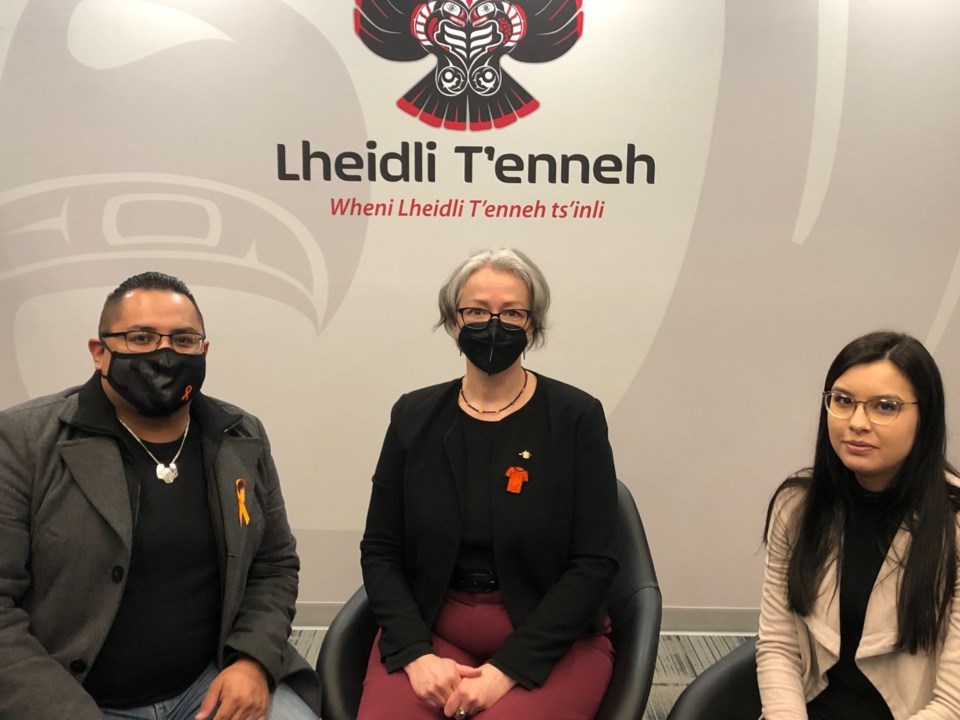Education Minister Jennifer Whiteside has made her first visit to Prince George since taking the position to discuss the work of the Special Advisors on Indigenous education experiences and outcomes within the school district.
Whiteside not only met with School District No. 57 (SD57)’s board of education, but representatives from both McLeod Lake Indian Band and Lheidli T’enneh First Nation as well as the newly formed Indigenous Education Leadership Table (IELT).
“There’s a lot of work being done to close the gaps and I am very heartened by the discussions we are having today,” said Whiteside, during a press conference at Lheildi T’enneh First Nation board offices.
“I think there has been a solid foundation laid here over the course of the last number of months that the special advisors have been working together with the board and with the Nations."
Whiteside appointed special advisors Kory Wilson and Catherine McGregor to review governance practices at the SD57 in February 2021 and a report was released in late August.
The special advisors made over 40 recommendations to improve the educational experiences for Indigenous students in SD57 and to repair the relationship with the two Nations and other Indigenous organizations.
“We are at the beginning of a journey here certainty not the end of a journey,” said Whiteside, adding she sees an ongoing role for the advisors, in some respect, as the board of education transitions into taking on more of the work.
“I want to say I am very excited about the IELT that has been established by the Nations. I think that is a very fruitful way to come together to work with the district in order to systematically address the system-level changes we need to see here,” said Whiteside.
“The IELT has come together in a way that is very clear with respect to their priorities with respect to the issues they think are most important to address first and foremost.”
Formed in January 2022, the IELT is comprised of Lheidli T’enneh First Nation and McLeod Lake Indian Band representatives that work collaboratively with the district in a government-to-government model using Dakelh Pitt House protocols.
“What is really fundamental here is the building of trust and accountability and transparency and I think that work is being done here,” added Whiteside.
While both nations are still advocating for two additional dedicated seats at the school board table for an Indigenous trustee from each nation, Whiteside said that is a longer-term discussion as it has implications under the School Act.
“Certainly, those changes would require consultations with nations broadly across the province as well as our other stakeholder groups and partner groups within education,” said Whiteside, adding that advocacy nations are engaged in with respect to education must be heard at the board level.
“I think the leadership table that has been established by McLeod Lake and Lheidli T’enneh is an opportunity to build that structural conduit to the board to ensure the issues perspectives and experiences represent are reflected and acted on by the board.”
The IELT current priorities include implementing anti-Indigenous racism policies in the district; establishing a whistleblower policy; getting an Indigenous superintendent on senior staff; calling for better reporting on Indigenous students and funding; as well as hiring an external ombudsperson.
“We as Indigenous Nations and people have no choice but to live in two worlds, so when we are asking for a spot for the trustees that is us living in the non-Indigenous world and when the school district and the board, and the provincial government come to our table they are learning about our Indigenous worldview,” added MLIB deputy chief Jayde Chingee.
“I think it is really important that we stand up our protocols our laws and we teach the public and school district about our culture, heritage, and knowledge.”
Whiteside said she believes the school board has been very receptive and is hopeful the IELT will help address issues of governance, accountability and transparency on a regional basis.






